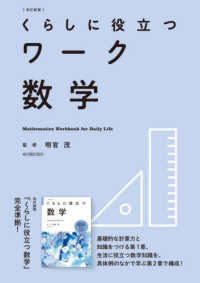- ホーム
- > 洋書
- > 英文書
- > History / World
Full Description
In the 1970s, the economic and social foundations of Western Europe underwent an unprecedented transformation. Old industries like coal and steel disappeared, millions of people lost their jobs and formerly flourishing towns and cities went into decline. Traditional political agendas gave way to new social problems and concerns. What happened to industrial citizens - their workplaces, their careers and their homes? How did social rights and political participation of workers change when markets became global, management lean and financial capital dominant? How did companies change and how were personal skills and work tasks reinvented under the impact of new technologies? How did workers - men and women - live through these decades of uncertainty and upheaval?
Lutz Raphael reconstructs the highly variegated story of deindustrialization in Western Europe with a particular focus on Britain, France and West Germany. Extending over three decades, this transformation was accompanied by significant rises in productivity and consumerism, but it also came at a heavy cost, ushering in many low-income jobs, growing inequality and a crisis of democratic representation. Its legacy is everywhere around us today - it is the transformation that has shaped our world.
Contents
Acknowledgements
Introduction
SECTION I. A BIRD'S EYE VIEW
Three National Labour Regimes in Transition
1. Industrial labour in Western Europe after the economic boom from the perspective of the political economy
2. Farewell to class struggle and fixed social structures
3. Political history from below: labour conflict and new social movements
4. Industrial citizens and wage earners: labour relations, social benefits and wages
5. Skilled work, production knowledge and educational capital: conflicts of interpretation and readjustments.
SECTION II. CLOSE-UPS
Fields of experience and horizons of expectation in times of upheaval
6. Life courses, work and unemployment in times of upheaval
7. Transformations in company regimes
8. Industrial districts, social spaces, 'problem neighbourhoods' and owner-occupier areas: social spaces and deindustrialization
Conclusion: The history of deindustrialization as a history of contemporary problems.
List of Illustrations
Sources and literature
Notes
Index







